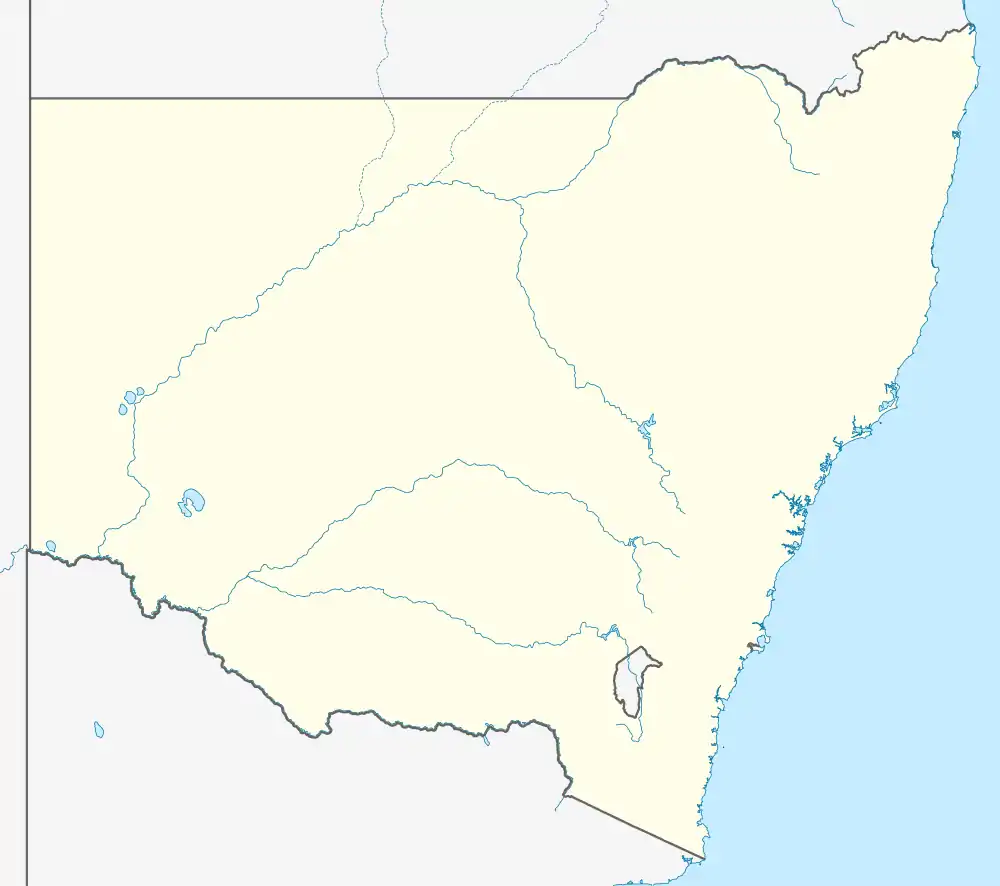Victoria Street railway station, New South Wales
Victoria Street railway station is a heritage-listed railway station located on the Main Northern line in New South Wales, Australia. It serves the Victoria Street area of East Maitland. It was added to the New South Wales State Heritage Register on 2 April 1999.[2]
Victoria Street | |||||||||||
|---|---|---|---|---|---|---|---|---|---|---|---|
 Westbound view in August 2006 | |||||||||||
| Location | Victoria Street, East Maitland Australia | ||||||||||
| Coordinates | 32°45′03″S 151°35′37″E | ||||||||||
| Owned by | Transport Asset Holding Entity | ||||||||||
| Operated by | NSW TrainLink | ||||||||||
| Line(s) | Main Northern | ||||||||||
| Distance | 187.92 km (116.77 mi) from Central | ||||||||||
| Platforms | 2 (1 island) | ||||||||||
| Tracks | 4 (2 passenger, 2 coal) | ||||||||||
| Connections | Bus | ||||||||||
| Construction | |||||||||||
| Structure type | Ground | ||||||||||
| Disabled access | Yes | ||||||||||
| Other information | |||||||||||
| Station code | VST | ||||||||||
| Website | Transport for NSW | ||||||||||
| History | |||||||||||
| Opened | 1877 | ||||||||||
| Passengers | |||||||||||
| 2013 | 470 (daily)[1] (Sydney Trains, NSW TrainLink) | ||||||||||
| Rank | 191 | ||||||||||
| Services | |||||||||||
| |||||||||||
| Location | |||||||||||
 Victoria Street, East Maitland Location within New South Wales | |||||||||||
History
It opened on 5 April 1857.[3]
It is in about the same location as the first East Maitland station and marked the temporary terminus of the railway from Newcastle while the bridge over Wallis Creek was built. From 1906 to 1926 it was also an interchange station with the steam tramway line that ran from West to East Maitland.
The present building was built in 1877 and in 1914 the single platform was converted to an island platform and a footbridge added when the line was duplicated.[4] The station footbridge was added along with the island conversion in 1914.[2]
From 2017 to 2018, under the Transport Access Program, Victoria Street Station received three new lifts, new canopies and signage, bike racks and improvements to the interchange areas.[5]
Platforms & services
Victoria Street has one island platform with two faces. It is serviced by NSW TrainLink Hunter Line services travelling from Newcastle to Maitland, Muswellbrook, Scone, Telarah and Dungog.[6]
| Platform | Line | Stopping pattern | Notes |
| 1 | services to Newcastle | [6] | |
|---|---|---|---|
| 2 | services to Maitland, Telarah, Dungog, Muswellbrook & Scone | [6] |
Transport links
Hunter Valley Buses operate four routes via Victoria Street station:
- 181: Woodberry to Rutherford[7]
- 182: Rutherford to Thornton[8]
- 183: Regiment Road to Tenambit[9]
- 184: Maitland to Chambers Street[10]
Heritage listing
Victoria Street station is one of the oldest station buildings surviving in the Newcastle area. The site was the terminus of the line from Newcastle when it opened in 1857 until extension to the present Maitland railway station one year later. It has been adapted to an island platform form for the duplication where most of the stations on the line were rebuilt. Because of its age and as a remnant of the early line it is of high significance. The footbridge supports the group.[2]
Victoria Street railway station was listed on the New South Wales State Heritage Register on 2 April 1999 having satisfied the following criteria.[2]
The place possesses uncommon, rare or endangered aspects of the cultural or natural history of New South Wales.
This item is assessed as historically rare. This item is assessed as scientifically rare. This item is assessed as arch. rare. This item is assessed as socially rare.[2]
References
- Bureau of Transport Statistics. "Train Statistics 2014" (PDF). Transport NSW. Retrieved 13 July 2018.
- "Victoria Street Railway Station group". New South Wales State Heritage Register. Office of Environment and Heritage. H01277. Retrieved 2 June 2018.
- Victoria Street Station NSWrail.net
- Victoria Street Railway Station NSW Environment & Heritage
- NSW, Transport for (1 July 2017). "Victoria Street Station Upgrade". www.transport.nsw.gov.au. Retrieved 6 October 2020.
- "Hunter line timetable". Transport for NSW.
- "Hunter Valley Buses route 181". Transport for NSW.
- "Hunter Valley Buses route 182". Transport for NSW.
- "Hunter Valley Buses route 183". Transport for NSW.
- "Hunter Valley Buses route 184". Transport for NSW.
Attribution
![]() This Wikipedia article contains material from Victoria Street Railway Station group, entry number 01277 in the New South Wales State Heritage Register published by the State of New South Wales and Office of Environment and Heritage 2018 under CC-BY 4.0 licence, accessed on 2 June 2018.
This Wikipedia article contains material from Victoria Street Railway Station group, entry number 01277 in the New South Wales State Heritage Register published by the State of New South Wales and Office of Environment and Heritage 2018 under CC-BY 4.0 licence, accessed on 2 June 2018.
External links
 Media related to Victoria Street railway station at Wikimedia Commons
Media related to Victoria Street railway station at Wikimedia Commons- Victoria Street station details Transport for New South Wales